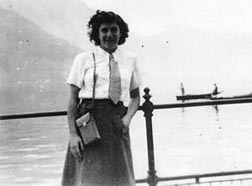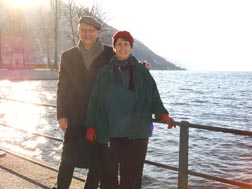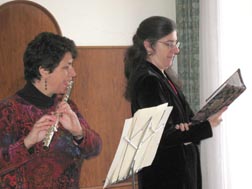The Seekers Holy Spirit Fund Takes me to Germany and Austria
By Anna Gilcher
 I can’t ever seem to figure out how to talk about the ten days I spent in Germany and Austria last month as part of a project entitled “For Tomorrow: The story and poetry of Hilda Stern Cohen.” The story is so big, so much bigger than I am, bigger than any of us who are associated with the project. I will give a very brief overview of the project here, and of my experience on the trip. Hilda was a German Jew, born in 1924.
I can’t ever seem to figure out how to talk about the ten days I spent in Germany and Austria last month as part of a project entitled “For Tomorrow: The story and poetry of Hilda Stern Cohen.” The story is so big, so much bigger than I am, bigger than any of us who are associated with the project. I will give a very brief overview of the project here, and of my experience on the trip. Hilda was a German Jew, born in 1924.
By Anna Gilcher
I can’t ever seem to figure out how to talk about the ten days I spent in Germany and Austria last month as part of a project entitled “For Tomorrow: The story and poetry of Hilda Stern Cohen.” The story is so big, so much bigger than I am, bigger than any of us who are associated with the project. I will give a very brief overview of the project here, and of my experience on the trip. Hilda was a German Jew, born in 1924. She was nine when Hitler came to power and spent twelve years undergoing horrific transports, life in ghettos and concentration camps, death marches, and innumerable “selections.” She survived, and in 1946 she came to the United States, married, and settled in Baltimore. She had a rich, full life after the war and had three children and twelve grandchildren. She died in 1997. After she died, her husband of fifty years, Werner, discovered composition books hidden away in a drawer containing more than 130 original poems in German—fabulous poems. She had talked about having been a poet, but never told anyone she still had the poetry. But here it was.
 |
|
Hilda in 1945. |
Werner had the poems translated so that their children would be able to read them, and then he contacted the Goethe Institut in Washington, where my father works. He brought my dad the poems, and they both agreed that the poetry should be published. They began work on a book, which appeared in 2003 in Germany. An English version of the book will be coming out early this year (2008).
In the meantime, a Jewish storyteller named Gail Rosen had been telling Hilda’s story since 1998, having conducted a series of interviews with Hilda in the year before her death. The poetry hadn’t been part of the story to begin with, but Gail began to weave it in. Werner introduced Gail and my dad to each other, and together, with the financial support of the Goethe Institut, they made trips to Israel and Germany to perform the piece.
 |
|
Anna and her father in the same spot |
Then, a couple of years ago, my dad began composing music for the poetry, and included a flute accompaniment for some of the pieces—which is how I finally got directly involved.
The performance is now a blend of music, prayer, and storytelling. Our singer, Liz Bolton, is a Reconstructionist Rabbi who is also an opera singer. She and Gail chant Hebrew prayers together throughout the performance—the prayers that Hilda said every day, as an observant Jew.
On our trip we visited places where the story takes place, and we filmed for the video documentary we are making. Last February, Liz, Gail, Tom (the pianist), my dad, and our videographer Eve went to Poland and performed/filmed in Auschwitz, the Lodz ghetto, and other important locations. On this trip, Tom wasn’t able to go, but Liz, Gail, my dad, Eve and I went.
We started out in Gmunden, Austria, where Hilda and her sister were in a DP camp. I felt like I was a character in A.S. Byatt’s novel Possession, because the timing kept being just exactly right, just like in a novel, and we were discovering new things that shed new light on the poetry and the story. For example, Hilda had written her address and room number in Gmunden on one of the composition books containing her poetry, and when we found the place, a former hotel, it turned out that the building was going to be destroyed in just two months. If we’d come a few months later, it would have been gone completely. At first it looked like we weren’t going to be able to go in, but after a very novelesque encounter with one of the sister-owners (who was at first adamant about no one being allowed in)—involving tea at the Hotel Schwan and going in two taxis to visit a 91-year-old friend of hers—we ended up filming in the room, looking out over the Traun lake. I can’t tell you how moving it was to play the music “Rain Over the Lake” in that room, looking over the lake (and it was even raining!), and to hear Gail reading a letter that Hilda had written to family in the US from Gmunden. Later I was flipping through the book of poetry and found a poem titled “Hotel.” Suddenly the poem took on a whole new meaning—we’d had no idea that the DP camp had been in a hotel. This was everything I used to think being a literary researcher might be like!
 |
|
Anna playing the flute and Liz Bolton singing in |
It was really integrating for me, playing the flute, being with my dad, speaking German, doing literary research, and also feeling God’s presence so strongly. Hilda’s story is very much a story of faith. I think that time in Gmunden was one of the most extraordinary moments of the trip, although being in Wurzburg, where Hilda had been a student in a Jewish school, and in Frankfurt, where she’d lived before being transported to Lodz, were all deep, important experiences.
Probably the other experience that left the deepest impression on me occurred in Nieder-Ohmen, at the end of our trip—we kind of went backwards through her life, starting with the DP camp where she spent her last year in Europe before emigrating, and ending in the town where she grew up. There we performed for a small but very engaged audience on Sunday evening (including two friends of mine who I’ve known for twenty years but rarely get to see—also a really wonderful and integrating experience for me) and then for about a hundred tenth-graders at the local school on Monday morning. It was hard to tell what the students were thinking or feeling, until we got to the end, and we asked them each to write on an index card the continuation of the following sentence: “If I could meet Hilda today, I would say…” and then we read a poem of sorts back to them, formed by their words. It was deeply moving to hear. We ended with a song that my dad composed for voice and flute, dedicated to the students of the school. The lyrics were written by the students who had heard the story in 2003 and had done a similar exercise, finishing the sentence “Ich frage mich…” (I wonder). It was a holy moment.
I am so grateful for Seekers’ help in my making this trip.
I hope you will join us for a performance of “For Tomorrow/Ich hoff’ auf morgen: The Story and Poetry of Hilda Stern Cohen” at Seekers on Saturday, February 23, at 7 p.m. The performance includes nine settings of Hilda’s poetry, and also the song “Ich frage mich.” You can find out more about the project by visiting www.hildastory.org.